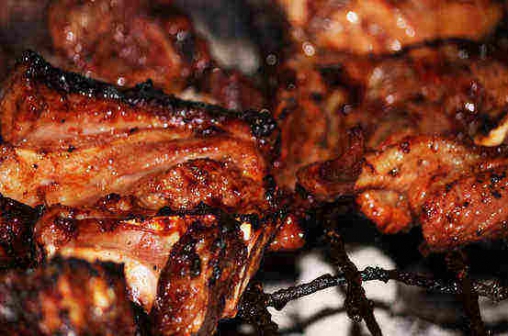The World Cancer Research Fund found a higher risk of stomach cancer for people drinking three or more alcoholic drinks a day. This is equivalent to more than 45g of alcohol per day. Eating the equivalent of 50g per day of processed meat - two rashers of bacon - was also linked to stomach cancer, while being overweight or obese also raised the risk.

Around 7,000 people are diagnosed with stomach cancer every year in the UK. It kills 5,000 a year. Most patients are only diagnosed after their cancer has begun to spread around the body. According to Cancer Research UK, doctors generally think a patient is doing very well if they are still alive two years after being diagnosed with advanced stomach cancer.
Men are twice as likely as women to develop stomach cancer, and it is more common in older adults. In the new report, WCRF scientists said there was “strong evidence” that drinking three or more alcoholic drinks per day increased the risk of stomach cancer, as did being overweight or obese. It brings the number of cancers linked to being overweight to eleven.
They also pointed to “strong evidence” that consuming foods preserved by salting increased the risk, such as pickled vegetables and salted or dried fish as is popular in Asia, and “strong evidence” that consuming processed meat increased the risk. The report said: “Processed meat is meat that has been preserved by smoking, curing or salting, or by the addition of preservatives. “Examples include ham, bacon, pastrami and salami, as well as hot dogs and some sausages.” Processed meat is already linked to bowel cancer, while being overweight or obese is linked to 10 different cancers.
The scientists also reported that there was “some evidence that suggests consuming grilled or barbecued meat and fish increases the risk of stomach cancer”, while consuming “little or no fruit” may increase the risk. There was also some evidence that eating citrus fruit could decrease the risk.
Dr Rachel Thompson, head of research interpretation at the WCRF, said: “This new evidence gives us a clearer picture. “We can now say, for the first time, that drinking alcohol, eating processed meat and being overweight or obese can all increase the risk of developing stomach cancers. “These findings will hopefully help people better understand what increases their risk of cancer so that they can make informed decisions about their lifestyles choices.”
In the UK, the lifetime risk of stomach cancer stands at one in 67 for men and one in 135 for women. WCRF experts believe more than 1,200 cases of stomach cancer in the UK could be prevented each year if people did not drink three alcoholic drinks per day, cut out processed meat and were a healthy weight. There would be 280 fewer cases thanks to a reduction in alcohol, 280 fewer due to cutting out processed meat and about 710 fewer if people were a healthy weight.
Prof Michael Leitzmann, from the University of Regensburg in Germany and one of the report’s leading experts, said: “The findings of this latest evidence report from World Cancer Research Fund are groundbreaking and show there is strong evidence linking the risk of developing stomach cancers to a number of different lifestyle factors, such as drinking alcohol and eating processed meat. “The evidence from this current report will help the public and the health community better understand what can influence the risk of developing stomach cancers. “It is an invaluable contribution to the growing evidence that exists on cancer prevention.”
 The Standard Group Plc is a multi-media organization with investments in media
platforms spanning newspaper print
operations, television, radio broadcasting, digital and online services. The
Standard Group is recognized as a
leading multi-media house in Kenya with a key influence in matters of national
and international interest.
The Standard Group Plc is a multi-media organization with investments in media
platforms spanning newspaper print
operations, television, radio broadcasting, digital and online services. The
Standard Group is recognized as a
leading multi-media house in Kenya with a key influence in matters of national
and international interest.











